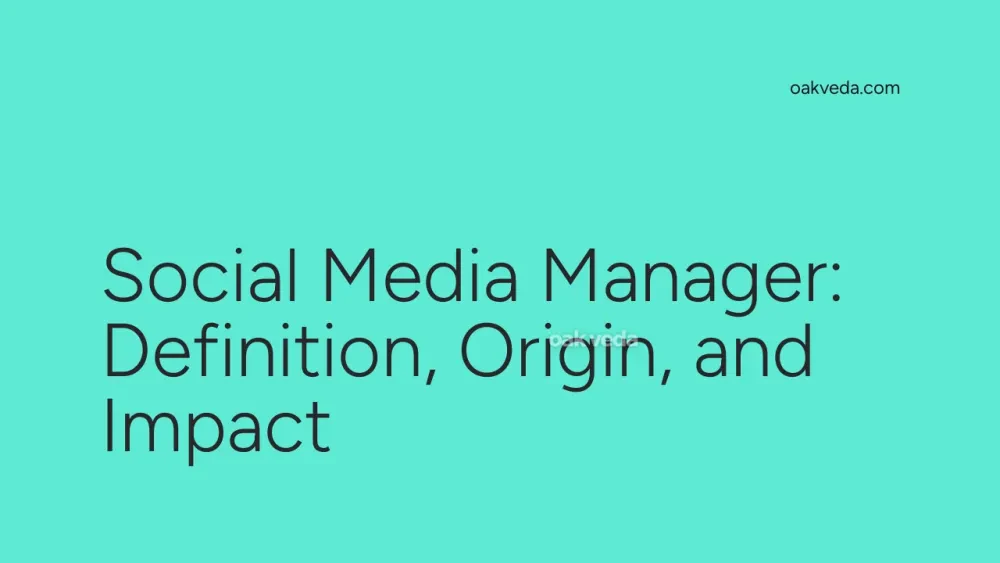
What is a Social Media Manager?
A social media manager is a professional responsible for developing, implementing, and overseeing an organization's social media strategy. They act as the voice of the brand across various social platforms, creating and curating content, engaging with followers, and analyzing performance metrics to drive growth and engagement.
Origin and Development of Social Media Management
The role of social media manager emerged in the late 2000s as social platforms like Facebook, Twitter, and LinkedIn gained popularity. As businesses recognized the potential of these platforms for marketing and customer engagement, the need for dedicated professionals to manage their online presence became apparent.
Initially, social media management was often an additional responsibility for marketing teams. However, as social media's importance in digital marketing grew, it evolved into a specialized role requiring a unique skill set.
How Social Media Management Works
Social media managers wear many hats in their day-to-day operations:
- Strategy Development: They create comprehensive plans aligning with business goals and target audience preferences.
- Content Creation: Managers produce engaging posts, images, videos, and other content types.
- Community Management: They interact with followers, respond to comments, and address concerns.
- Analytics and Reporting: Tracking performance metrics and adjusting strategies based on data insights.
- Trend Monitoring: Staying updated on platform changes and industry trends.
- Collaboration: Working with various departments to ensure consistent brand messaging.
Types of Social Media Management Roles
The field of social media management has diversified as the industry has matured:
- In-house Social Media Managers: Work exclusively for one company or brand.
- Agency Social Media Managers: Handle multiple clients across various industries.
- Freelance Social Media Managers: Offer services to multiple clients independently.
- Social Media Specialists: Focus on specific platforms or aspects of social media marketing.
Popular Tools Used by Social Media Managers
To streamline their work, social media managers rely on various tools:
- Scheduling Platforms: Buffer, Hootsuite, Later
- Analytics Tools: Sprout Social, Google Analytics, native platform insights
- Design Tools: Canva, Adobe Creative Suite
- Content Curation: Feedly, BuzzSumo
- Project Management: Trello, Asana
Impact of Social Media Managers on Digital Culture
Social media managers have significantly influenced online culture and brand-consumer relationships:
- Brand Humanization: They've given brands relatable personalities and voices.
- Real-time Marketing: Enabled quick responses to trending topics and events.
- Customer Service Evolution: Transformed customer support into a public, real-time interaction.
- Content Democratization: Leveled the playing field for businesses of all sizes to reach audiences.
Controversies and Challenges in Social Media Management
The role is not without its challenges:
- Work-Life Balance: The 24/7 nature of social media can lead to burnout.
- Crisis Management: Navigating PR disasters and negative feedback in real-time.
- Algorithm Changes: Constantly adapting to platform updates that affect content reach.
- Ethical Concerns: Balancing brand promotion with authentic engagement and privacy concerns.
How Brands and Influencers Leverage Social Media Management
Effective social media management has become crucial for brand success:
- Brand Awareness: Consistent posting and engagement increase visibility.
- Lead Generation: Strategic content and campaigns drive potential customers to action.
- Customer Loyalty: Regular interaction builds stronger relationships with audiences.
- Influencer Collaborations: Managers often coordinate with influencers to expand reach.
Future Trends in Social Media Management
The field continues to evolve rapidly:
- AI and Automation: Increased use of chatbots and AI-driven content creation.
- Video Dominance: Growing emphasis on short-form video content across platforms.
- Social Commerce: Integration of shopping features directly into social platforms.
- Data Privacy Focus: Adapting strategies to comply with evolving privacy regulations.
- Niche Platform Expertise: Specialization in emerging platforms like TikTok or Discord.
FAQs about Social Media Managers
-
What skills does a social media manager need? Strong writing, creativity, analytical thinking, and adaptability are crucial.
-
How much do social media managers earn? Salaries vary widely but typically range from $40,000 to $100,000+ depending on experience and location.
-
Do I need a degree to become a social media manager? While not always required, degrees in marketing, communications, or related fields are common.
-
How do social media managers measure success? Through metrics like engagement rates, follower growth, website traffic, and conversions.
-
Can social media management be automated? Some aspects can be automated, but human oversight remains crucial for strategy and authentic engagement.
In conclusion, social media managers play a vital role in shaping brand identities and driving digital marketing success. As social platforms continue to evolve, these professionals will remain at the forefront of digital communication strategies, adapting to new technologies and trends to keep brands relevant and engaged with their audiences.
You may be interested in:
- Slay: Definition, Origin, and Impact on Social Media Culture
- #XYZBCA: Definition, Origin, and Impact on TikTok
- Meme: Definition, Origin, and Impact on Social Media
- Say Less: Definition, Origin, and Impact on Social Media
- @-Me: Definition, Origin, and Impact on Social Media
- Blue Checkmark: Definition, Origin, and Impact on Social Media

